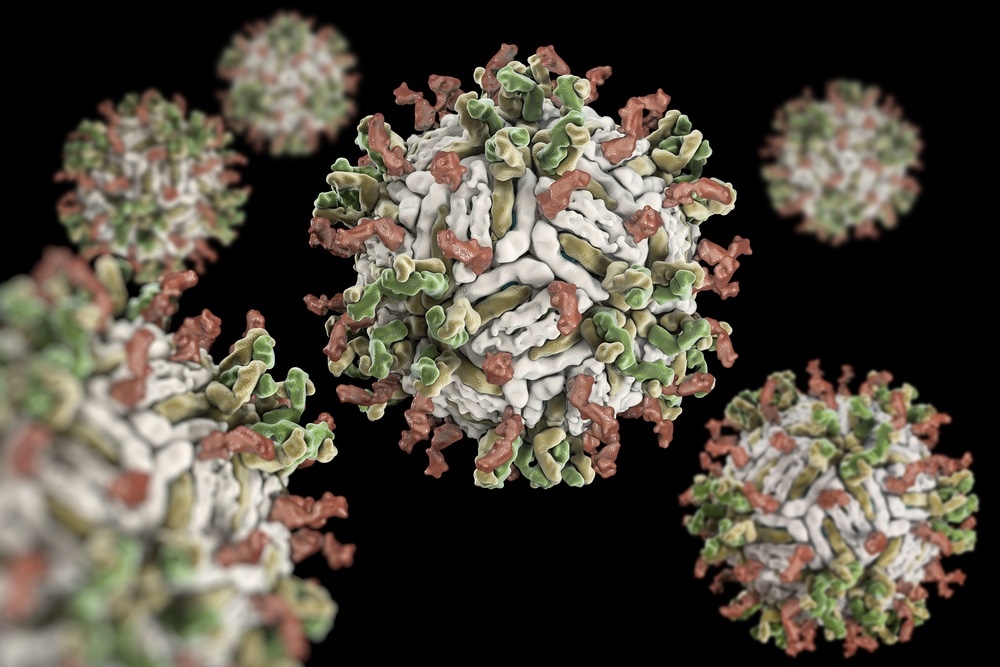Researchers from Nanjing University of Posts and Telecommunications alongside those at the Wadsworth Center and Fen Zhou of New York University have developed a new method for detecting and destroying the dengue virus that could be adapted for use on other viruses.
 Image Credit: vitstudio / Shutterstock.com
Image Credit: vitstudio / Shutterstock.com
Innovation is the most sensitive test for dengue
The research, published today in Nature Chemistry, details how the technique identifies viruses in the bloodstream and kills them using sections of DNA folded into star shapes using structural DNA nanotechnology. The folded DNA stars are used as traps that capture the virus in the bloodstream, and once in the trap, it causes it to light up.
The results show that the innovation is more sensitive than any alternative test for dengue fever currently on the market, it has been proven to be 100 times for effective at detecting dengue fever than other clinical tests. The test can reliably be used to detect dengue from the first day of detection due to the tight binding and high specificity of the process.
The paper also discusses how the technique could theoretically be developed to capture and destroy other viruses, which could have a huge impact on the detection and treatment of a number of illnesses.
The World Health Organization outlines that there is currently no specific treatment for dengue infection and that early detection of the disease is key to lowering fatality rates. This shows that a highly sensitive detection technique with the capability of detecting infection from the first day could have a significant impact on reducing fatalities from dengue.
What is more, recent decades have seen a huge increase in the incidence of the infection, which currently affects around 390 people a year, signaling the urgency of establishing an ultra-sensitive test for dengue virus.
Effectivity against other illnesses
The researchers believe that their innovation could be used against other viruses. They highlight that all viruses work in the same way to infect their host by attaching themselves to the cell wall and injecting in their DNA.
A previous 2016 study showed the effectiveness of a constructed synthetic polymer that was used to trap and destroy the influenza virus before it attached itself to lung cells. However, the synthetic polymer was suspected to be potentially toxic to the human body and, therefore, had little use as a therapeutic device. The DNA star, however, is non-toxic to the body.
The team used structural DNA nanotechnology to fold strands of DNA into intricately designed star-shaped traps that are biodegradable and non-toxic. The shape of the traps was designed specifically to capture dengue, to match the multiple latch points on the virus that exist to catch a cell surface. The DNA star was constructed with attached specific molecules attached that bind to the viral latches.
The DNA star begins to fluoresce once it is attached to the virus, making it easy to spot in a blood test. Next, the team will work on using a DNA origami nanoplatform to recreate the DNA star shape of aptamers, which will be used to kill the virus once bound to them. The method could be adapted to work with different viruses, designing the DNA stars to address the shape of different viruses specifically.
Future directions
The research team has developed a successful method that incorporates a novel strategy with emerging technology. They present a technique that surpasses currently available diagnostic tools for dengue, as well as offering a design that can be adapted to target other viruses. The future may see the advancement of this method for use on identifying and treating a number of illnesses, changing the face of virus-based illnesses.
Source:
Structurally designed DNA star creates ultra-sensitive test for dengue virus. Eurekalert. Available from: https://www.eurekalert.org/emb_releases/2019-11/rpi-sdd112019.php